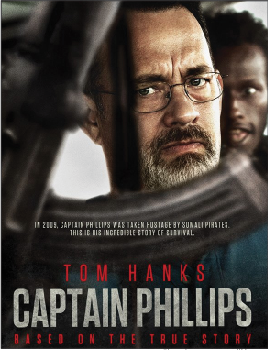Let’s Get Reel: Captain Phillips
Captain Phillips is a frustratingly wonderful movie. Its two stars turn in performances that are arguably some of the best of their careers, but it pulls its punches early on which leaves the movie feeling tense and high strung. I suppose I should start from the beginning though. Captain Phillips is a movie chronicling the 2009 hijacking of the cargo ship Maersk Alabama and the subsequent trials and tribulations that its captain Rich Phillips undergoes at the hands of a group of Somali pirates led by Abduwali Abdukhadir Muse. Do not let the title fool you however, this movie is just as much about the Somali pirates as it is about Captain Phillips.
Captain Phillips is a Paul Greengrass project that adheres to two principles: don’t take a side, and use shaky cam as much as possible. Both principles are both crucial to what makes the movie great and also what made it such a frustrating experience at times.
Brief mention of the use of shaky cam. Greengrass uses it liberally, and because of the marine setting it occasionally made me nauseous. However, when it is used to convey to shifting power dynamics and the general lack of control either side has on the situation it works brilliantly.
On to the neutral stance this movie takes. This is not a movie about the triumph and perseverance of an American man in the face of danger. There is no happy ending. Tom Hanks plays Captain Phillips as a man who knows exactly how this situation is going to end and is determined to live to see that point. Hanks’ performance is phenomenal, and if it wasn’t for the fact that he’s also playing Walt Disney later this year I’d say his performance is a shoo in for an Oscar nomination. The real strength of this movie and the major reason why it succeeds as a neutral piece is because of one man: Barkhad Abd as Muse, the leader of the pirates. This is Barkhad’s first appearance on screen, and he has no prior acting experience. Not only does he hold his own against Tom Hanks, he at times steals the spotlight by really conveying the hopelessness and lack of choice in the Somali’s situation.
It is established early on that Muse and his crew have been forced into service by a Somali warlord, and if they don’t deliver money they will die. Barkhad sells the depression and anxiety of a man who is smart enough to know that he’s going to die no matter what he chooses, and has resigned himself to just trying to make sure his village survives. This connection between Barkhad and Hanks is what drives most of the movie; each is trying to gain the upper hand and make the best of their situation. The dynamic this creates is one where the audience doesn’t really want either side to lose, but more just wishes everyone would stop and go home.
This tension is only heightened when the movie occasionally switches over to following the SEAL team who will execute the pirates. The SEALs are the closest thing this movie truly has to an antagonist; they are not characterized, and they are not humanized. The SEALs are a force of nature and they are going to bring this mess to a bloody conclusion no matter what.
Everyone is going to walk away from Captain Phillips with their opinion, and you might not be entirely certain whether or not you agree with what you think the movie means: should we sympathize with the Somali pirates? Should we be happy when the SEALs come or should we be relieved? These questions are important not only because they mean that Captain Phillips has depth, but also because it’s going to start a conversation. The fact that the movie humanizes the pirates at all is a bold move and not everyone will agree with it – hell if you’ve read the review you can tell I’m still not sure what I think of the movie as a statement.
That said, I can tell you this: go see this movie. It functions as a simply astounding thriller and gets you thinking about the conflict at play as more than just good guys vs. bad guys. Captain Phillips is an intense thriller with some great actors turning in some of the best acting of their careers, and it deserves your time and attention. And maybe, just maybe, you’ll walk away a little less quick to judge a situation until you hear both sides of the story – and that’s a message worth watching.



